De Russische dichter Nikolay Nekrasov werd geboren op 4 december 1821 in Nemirovo. Zie ook alle tags voor Nikolay Nekrasov op dit blogen ook mijn blog van 4 december 2009.
Freedom
( Written at the time of the emancipation of the serfs. )
O’er thy plains, my native country,
In the years now past away,
Never did I ride with feelings
Such as fill my soul to-day!
In its mother’s arms reposing,
Lo! a peasant’s child I see,
And my heart is stirred to gladness
By a thought most dear to me.
You were born in times auspicious,
Child, into this world below;
With God’s help, in days before you,
Pain and grief you shall not know.
With the light of youth around you,
Ere you enter on the strife,
Freely and with none to hinder
You shall choose your path in life.
You shall, if you so desire it,
Be a peasant evermore;
If you have the power within you,
Like an eagle you shall soar.
But, it may be, many errors
Lurk in fancies such as these,
For man’s intellect is subtle,
Swayed and influenced with ease.
And, beside the snares of old time
Spread the peasants’ feet before,
Well I know designing people
Have invented many more.
Yes, but for the folk to break them
It no harder task will be.
Then, O Muse, with hope and gladness
Hail the dawn of liberty!
Vertaald door Alice Stone
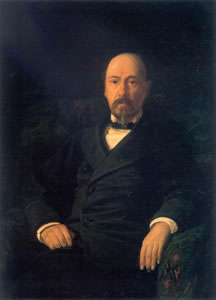
Nikolay Nekrasov (4 december 1821 – 8 januari 1878)
Portret door Nikolay Gay, 1872
De Surinaamse dichteres en cultureel antropologe Gertrude (Trudi) Marie Guda werd geboren in Paramaribo op 4 december 1940. Zie ook alle tags voor Trudi Guda op dit blog.
Uur van de hond
Tussen gebarsten levens
staat mijn huis
Mijn hond gaat schurftig rond
en jankt niet meer
wanneer een reiziger ineenzakt
en met koude handen
tast over de wanden
Zonder te groeten wordt een dode weggebracht
Langdradig huilt mijn hond
om Brood
Wijd, schurend, kamt zijn mond de lucht
Wij drinken water
waarin lijken zich ontbinden
Wij zijn melaats en blind
Soms draagt de wind
de kinderen nog gaaf
Maar pest bezeert de lucht
voordat het Brood
gevonden wordt
Mistroostig vraagt mijn hond om licht
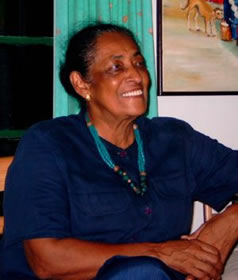
Trudi Guda (Paramaribo, 4 december 1940)
De Franse schrijver René Fallet werd geboren op 4 december 1927 in Villeneuve-Saint-Georges. Zie ook alle tags voor René Fallet op dit blog.
Uit: Georges Brassens
“Georges, tu ne m’as pas enterré.
Moi non plus.
Il ne nous manquera, ne nous aura manqué que cela. Pas grave.
Nouvelles de la mort. Notre chat Bonnot disparaît après huit ans de tendre et précieuse compagnie.
Quant à moi je traîne toujours entre deux eaux avec parfois l’impression – désagréable – de m’éteindre doucettement. Georges est peut-être mort très très vieux à soixante ans. Y parviendrons-nous… ? La question sera posée. Ce serait le moment ou jamais d’écrire Demain il fera nuit. Je suis cuit à point. Je ressemble aux grands-pères que je n’ai pas connus.
Ce ne serait pas un livre ” d’humour et de verve “. Il serait dédié à Georges à peu près de la sorte : ” A Georges au fond du jardin.
Attends-moi cinq minutes.
Pense à l’eau fraîche pour le pastis. René.
” Mais je n’ai plus – n’aurai plus ? – le cœur ou le courage de me rasseoir face à un cahier.
C’est dérisoire auprès de tout ce noir que j’ai approché… Avec Georges nous parlions en riant de la mort.
Ne serait-ce que pour ce détail il m’est irremplaçable.
Depuis qu’il est mort, la mort ne fait plus rire personne. Un rien de dérision sauve l’honneur de l’homme.
Le Diable est ce type qui a refusé de vendre son âme à Dieu.”
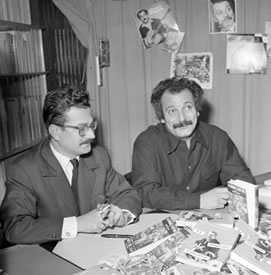
René Fallet (4 décember 1927 – 25 juli 1983)
Fallet hier links, met Georges Brassens
De Engelse schrijver, componist, filoloog en schilder Samuel Butler werd geboren op 4 december 1835 in Langar, Nottinghamshire. Zie ook mijn blog van 4 december 2008 en ook mijn blog van 4 december 2009.
Uit: Cambridge Peaces. Our Tour
„As the vacation is near, and many may find themselves with three weeks’ time on their hand, five-and-twenty pounds in their pockets, and the map of Europe before them, perhaps the following sketch of what can be effected with such money and in such time, may not come amiss to those, who, like ourselves a couple of years ago, are in doubt how to enjoy themselves most effectually after a term’s hard reading.
To some, probably, the tour we decided upon may seem too hurried, and the fatigue too great for too little profit; still even to these it may happen that a portion of the following pages may be useful. Indeed, the tour was scarcely conceived at first in its full extent, originally we had intended devoting ourselves entirely to the French architecture of Normandy and Brittany. Then we grew ambitious, and stretched our imaginations to Paris. Then the longing for a snowy mountain waxed, and the love of French Gothic waned, and we determined to explore the French Alps. Then we thought that we must just step over them and take a peep into Italy, and so, disdaining to return by the road we had already travelled, we would cut off the north-west corner of Italy, and cross the Alps again into Switzerland, where, of course, we must see the cream of what was to be seen; and then thinking it possible that our three weeks and our five-and-twenty pounds might be looking foolish, we would return, via Strasburg to Paris, and so to Cambridge. This plan we eventually carried into execution, spending not a penny more money, nor an hour’s more time; and, despite the declarations which met us on all sides that we could never achieve anything like all we had intended, I hope to be able to show how we did achieve it, and how anyone else may do the like if he has a mind. A person with a good deal of energy might do much more than this; we ourselves had at one time entertained thoughts of going to Rome for two days, and thence to Naples, walking over the Monte St. Angelo from Castellamare to Amalfi (which for my own part I cherish with fond affection, as being far the most lovely thing that I have ever seen), and then returning as with a Nunc Dimittis, and I still think it would have been very possible; but, on the whole, such a journey would not have been so well, for the long tedious road between Marseilles and Paris would have twice been traversed by us, to say nothing of the sea journey between Marseilles and Civita Vecchia. However, no more of what might have been, let us proceed to what was.“
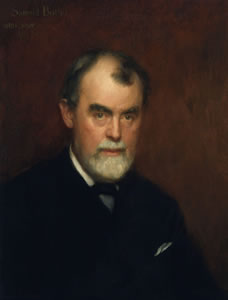
Samuel Butler (4 december 1835 – 18 juni 1902)
Portret door Charles Gogin
De Schotse schrijver Thomas Carlyle werd geboren in Ecclefechan, gelegen in de regio Dumfries and Galloway in Schotland op 4 december 1795. Zie ook mijn blog van 4 december 2008 en ook mijn blog van 4 december 2009.
Cui Bono
Thomas CarlyleWhat is Hope? A smiling rainbow
Children follow through the wet;
’Tis not here, still yonder, yonder:
Never urchin found it yet.
What is Life? A thawing iceboard
On a sea with sunny shore;—
Gay we sail; it melts beneath us;
We are sunk, and seen no more.
What is Man? A foolish baby,
Vainly strives, and fights, and frets;
Demanding all, deserving nothing;—
One small grave is what he gets.
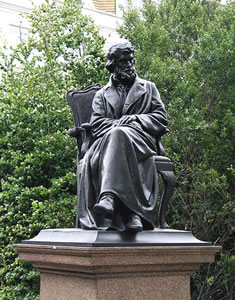
Thomas Carlyle (4 december 1795 – 5 februari 1881)
Standbeeld van Joseph Edgar Boehm in Londen, Chelsea
